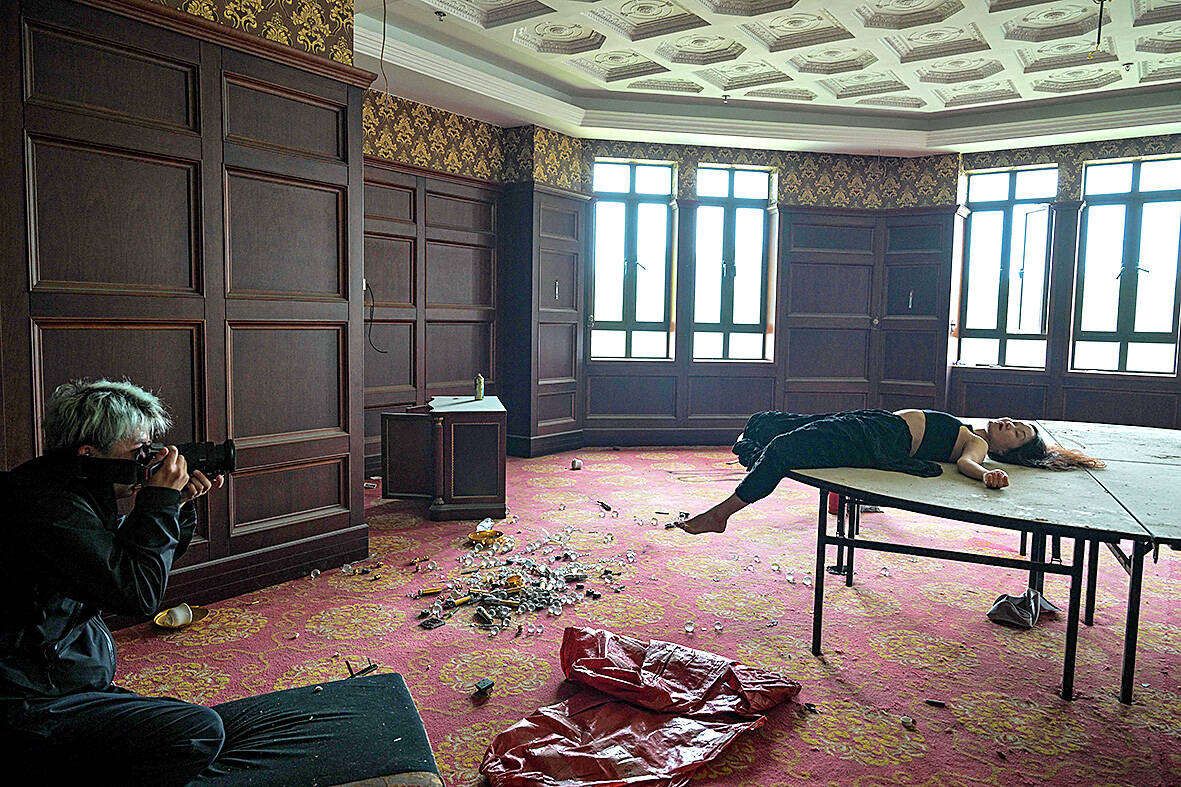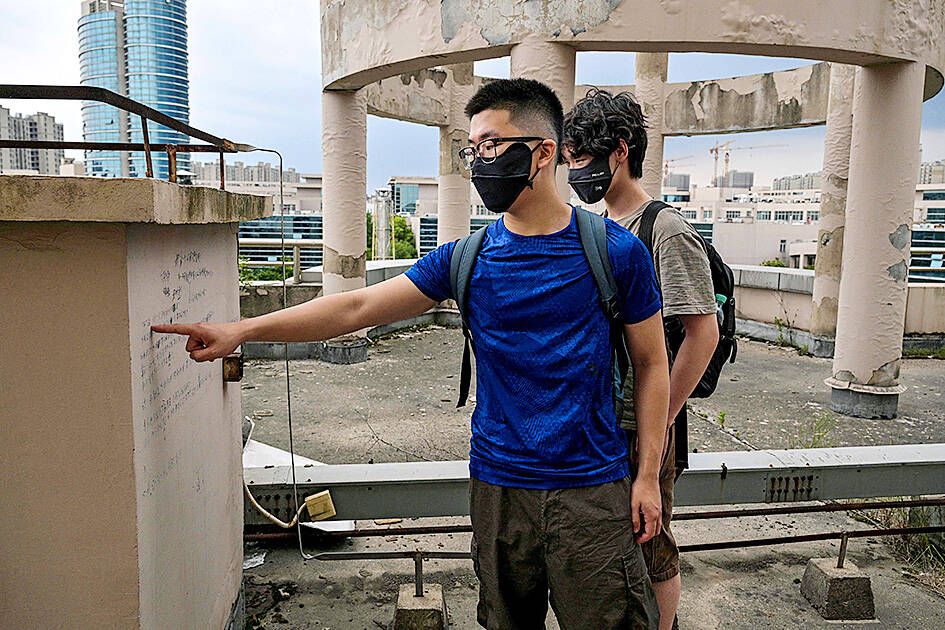Xu Pengcheng looks over his shoulder and, after confirming the coast is clear, helps his crew of urban adventurers climb through the broken window of an abandoned building.
Long popular in the West, urban exploration, or “urbex” for short, sees city-dwelling thrill-seekers explore dilapidated, closed-off buildings and areas — often skirting the law in the process.
And it is growing in popularity in China, where a years-long property sector crisis has left many cities dotted with empty buildings.

Photo: AFP
Xu, a 29-year-old tech worker from the eastern city of Qingdao, has amassed hundreds of thousands of followers for his photos of rundown schools and vacant cinemas. “When people see these images, they find them incredibly fresh and fascinating,” he said.
“The realization that so many abandoned buildings exist — and that they can photograph so beautifully — naturally captures attention.”
Xu and his comrades arrived on May 24 at a deserted hotel in the outskirts of Shanghai for a unique photoshoot.

Photo: AFP
From the outside, the hotel looked like a prefabricated medieval castle. Once inside, it was clear the property had been abandoned for years. Searching through the rooms for good spots for striking photos, Xu and his friends came across remnants of the hotel’s past — a mahjong table, laundry sheets and piles of dinner plates. Props from past photoshoots were scattered on the floor and on one ballroom wall, “Long Live Chairman Mao” was written in spray paint.
China’s recent property market downturn has left many abandoned large-scale projects ready ground for urban explorers.
“I don’t think you would find sites like this in Europe,” long-time explorer Brin Connal said as he walked around an empty, abandoned building.

Photo: AFP
“In China, there’s a lot of these places which are unfinished.”
SENSE OF COMMUNITY
One such unfinished megaproject in Shanghai, the Pentagon Mall, has become such a hotspot that explorers leave messages for each other on the walls of its top floor.
“I think this is something really special about Chinese urban exploration,” said Sean, a Shanghai resident who did not want to give his real name. “There’s a very strong sense of community and it’s very, very welcoming.”
Situated in Shanghai’s Pudong district, the project came close to completion in 2009 but investment fell through.
The giant concrete building now sits mostly in disrepair — broken tiles litter the ground and a large faded map of the uncompleted mall is barely visible under a thick layer of dust. Some rooms still have signs of life, with mattresses from squatters, discarded takeout and cigarette boxes and even laundry hanging outside.
“In places like Shanghai, people always find a way to make use of these buildings, even if they’re not completely built and completely usable,” said Sean’s exploration partner Nov, who also asked to go by a pseudonym.
WAY TOO DANGEROUS
Chinese social media companies are less enthusiastic. Looking up abandoned buildings on Instagram-like Xiaohongshu, users are met with a message warning “there are risks in this area, please pay attention to safety and comply with local policies and regulations.”
Connal, originally from the UK, said he understood the restrictions. “Some of them are way too dangerous, and some of these abandoned locations were getting overwhelmed with people,” he said.
The hobby also takes place in a legal grey area.
Many urban explorers go by a simple mantra — taking nothing from the places they visit and leaving nothing behind. But the act of trespassing can come with fines in China, just as it does in the West. Xu also acknowledged the risks that come with urban exploration — from angry security guards to errant circuitry.
“Firstly, you might face the risk of trespassing illegally. Secondly, private properties may have security guards or be completely sealed off,” he said. “These locations often involve hazards like no electricity or lighting, structural damage, and injuries from construction materials like exposed nails.” But model Mao Yi said the hobby offered a respite from the drudgery of big city living.
“Living in these sprawling metropolises of steel and concrete, we’ve grown familiar with the routines of daily life,” she said.

Taiwan has next to no political engagement in Myanmar, either with the ruling military junta nor the dozens of armed groups who’ve in the last five years taken over around two-thirds of the nation’s territory in a sprawling, patchwork civil war. But early last month, the leader of one relatively minor Burmese revolutionary faction, General Nerdah Bomya, who is also an alleged war criminal, made a low key visit to Taipei, where he met with a member of President William Lai’s (賴清德) staff, a retired Taiwanese military official and several academics. “I feel like Taiwan is a good example of

March 2 to March 8 Gunfire rang out along the shore of the frontline island of Lieyu (烈嶼) on a foggy afternoon on March 7, 1987. By the time it was over, about 20 unarmed Vietnamese refugees — men, women, elderly and children — were dead. They were hastily buried, followed by decades of silence. Months later, opposition politicians and journalists tried to uncover what had happened, but conflicting accounts only deepened the confusion. One version suggested that government troops had mistakenly killed their own operatives attempting to return home from Vietnam. The military maintained that the

Jacques Poissant’s suffering stopped the day he asked his daughter if it would be “cowardly to ask to be helped to die.” The retired Canadian insurance adviser was 93, and “was wasting away” after a long battle with prostate cancer. “He no longer had any zest for life,” Josee Poissant said. Last year her mother made the same choice at 96 when she realized she would not be getting out of hospital. She died surrounded by her children and their partners listening to the music she loved. “She was at peace. She sang until she went to sleep.” Josee Poissant remembers it as a beautiful

Before the last section of the round-the-island railway was electrified, one old blue train still chugged back and forth between Pingtung County’s Fangliao (枋寮) and Taitung (台東) stations once a day. It was so slow, was so hot (it had no air conditioning) and covered such a short distance, that the low fare still failed to attract many riders. This relic of the past was finally retired when the South Link Line was fully electrified on Dec. 23, 2020. A wave of nostalgia surrounded the termination of the Ordinary Train service, as these train carriages had been in use for decades